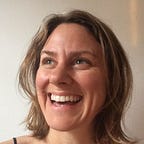Bren Smith, on the Future of Ocean Farming
Hi, I’m Bren, creator of: GreenWave. We’re training the next generation of ocean farmers to grow seagreens — for food (“kelp is the new kale!”) and other uses.
Hometown: New Haven, Connecticut. Grew up further north, in Maddox Cove, Newfoundland — it’s the eastern-most village in North America.
10 years ago, I said the biggest challenge was overfishing and the depletion of fishing stocks. I had witnessed the summer of ’92 when the cod stocks crashed and 30,000 people lost their jobs — those fishermen were my early heroes, so it had a big impact on me.
Today, I say: We have to solve for the twin crises of climate change and inequality. There are no jobs on a dead planet, so the question we all face is how to make a living on a living planet. Restorative ocean farming is a solution that ticks a few boxes. And all you need to start an ocean farm: $20,000 and a boat.
Surprising facts: 1) More U.S. territory sits below sea level than above; 2) If we farm even as little as 5 percent of U.S. waters, we can create as many as 50 million jobs along the new value chain, and the protein equivalent of 3 trillion hamburgers; 3) Demand for seagreens is growing and there are even mainstream precedents: McDonalds made a partial seaweed burger in the ’90s that was the NBA official burger. It stayed on the menu for 4 years!
3 products/innovations/trends I can’t stop talking about: 1) The use of bioplastics made from seaweed for water bottles and food packaging; 2) Collective business models, like perpetual trust, and new forms of climate-friendly financing; 3) Women as architects of ocean farming. Right now, the industry is majority-women: how will this look in 5, 10 years?
When I last changed my mind and why: I started GreenWave thinking the best way to scale was: try to control everything. Now I think the opposite: let’s build a movement. It’s the fastest way to scale to a level that will have large climate impacts, and it’s also sturdier because it’s owned by many.
Advice to my 15-year old self: Ha! I just wrote a book about my life and adventures, Eat Like A Fish. One guy read it and said: “I feel sorry for your mom!” It’s true, I was a handful as a young person, and I dropped out of high school — a good move in my case because it led me to live a self-directed life. In general, I’d say young people need to feel free, feel trusted as contributors.
I’m inspired by: Many changemakers. I’ll say Dune Lankard up in Alaska, who fought for the Exxon spill reparations. Also Paula Daniels, who’s taken on some of the most challenging pieces of food system reform, like institutional purchasing and logistics. If she cracks that nut, it will make our job at GreenWave way easier.
I’m tagging for next time: Morgan Dixon, my friend, fellow Ashoka Fellow, and cofounder of Girltrek. She has figured out how to get to scale and what her end game is!
Read more about Bren and what seagreens can teach us about building a better economy here. And/or follow Bren and his team on Twitter: @GreenWaveOrg
